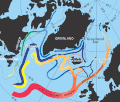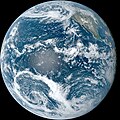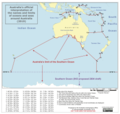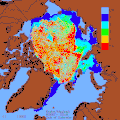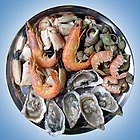The Oceans Portal
A portal dedicated to oceans, seas, oceanography and related topics
– Hover over image and scroll to middle for controls to see more selected panorama images –
Introduction
| Earth's ocean |
|---|
|
Main five oceans division: Further subdivision: Marginal seas |

The ocean is the body of salt water that covers approx. 70.8% of Earth. In English, the term ocean also refers to any of the large bodies of water into which the world ocean is conventionally divided. The following names describe five different areas of the ocean: Pacific, Atlantic, Indian, Antarctic/Southern, and Arctic. The ocean contains 97% of Earth's water and is the primary component of Earth's hydrosphere, thus the ocean is essential to life on Earth. The ocean influences climate and weather patterns, the carbon cycle, and the water cycle by acting as a huge heat reservoir. (Full article...)

A sea is a large body of salty water. There are particular seas and the sea. The sea commonly refers to the ocean, the wider body of seawater. Particular seas are either marginal seas, second-order sections of the oceanic sea (e.g. the Mediterranean Sea), or certain large, nearly landlocked bodies of water. (Full article...)
Oceanography (from Ancient Greek ὠκεανός (ōkeanós) 'ocean', and γραφή (graphḗ) 'writing'), also known as oceanology, sea science, ocean science, and marine science, is the scientific study of the oceans. It is an Earth science, which covers a wide range of topics, including ecosystem dynamics; ocean currents, waves, and geophysical fluid dynamics; plate tectonics and seabed geology; and fluxes of various chemical substances and physical properties within the ocean and across its boundaries. These diverse topics reflect multiple disciplines that oceanographers utilize to glean further knowledge of the world ocean, including astronomy, biology, chemistry, geography, geology, hydrology, meteorology and physics. Paleoceanography studies the history of the oceans in the geologic past. An oceanographer is a person who studies many matters concerned with oceans, including marine geology, physics, chemistry, and biology. (Full article...)
Selected article -

Marine art or maritime art is a form of figurative art (that is, painting, drawing, printmaking and sculpture) that portrays or draws its main inspiration from the sea. Maritime painting is a genre that depicts ships and the sea—a genre particularly strong from the 17th to 19th centuries. In practice the term often covers art showing shipping on rivers and estuaries, beach scenes and all art showing boats, without any rigid distinction - for practical reasons subjects that can be drawn or painted from dry land in fact feature strongly in the genre. Strictly speaking "maritime art" should always include some element of human seafaring, whereas "marine art" would also include pure seascapes with no human element, though this distinction may not be observed in practice.
Ships and boats have been included in art from almost the earliest times, but marine art only began to become a distinct genre, with specialized artists, towards the end of the Middle Ages, mostly in the form of the "ship portrait" a type of work that is still popular and concentrates on depicting a single vessel. As landscape art emerged during the Renaissance, what might be called the marine landscape became a more important element in works, but pure seascapes were rare until later. (Full article...)Interesting facts -
- The Silent World, an Academy Award winning documentary film by Jacques Cousteau, was the first film to use underwater cinematography to show the ocean depths in color.
- Henry Seamount was hydrothermally active in the last 4,000 years even though it is 126 million years old.
- The Polynesian Rat is used to track human migrations across the Pacific Ocean.
Selected list articles and Marine habitat topics
| Marine habitats |
|---|
| Coastal habitats |
| Ocean surface |
| Open ocean |
| Sea floor |
- List of oceans
- List of ancient oceans
- List of seas
- List of circumnavigations
- List of cruise lines
- List of largest lakes and seas in the Solar System
- List of marine biologists
- List of marine ecoregions
- List of maritime explorers
- List of naval battles
- List of ocean liners
- List of oceanographic institutions and programs
- List of oldest surviving ships
- List of rogue waves
- List of seafood dishes
- List of submarine topographical features
Tasks
 |
Here are some tasks awaiting attention:
|
General images -
Related portals
In the news
- 14 June 2024 – Red Sea crisis
- The United States military launches attacks on and destroys 7 Houthi radar stations in Yemen in retaliation after a merchant sailor went missing following Houthi strikes on ships in the Red Sea. (The Seattle Times)
- 13 June 2024 –
- A Russian warship and a nuclear-powered submarine conduct military drills in the Caribbean sea simulating a missile strike on enemy ships after passing near the coast of Florida in order to reach Havana, Cuba. (AP)
- 12 June 2024 – Red Sea crisis
- The Houthis strike and sink the Greek-owned, Liberian-flagged cargo ship Tutor with an unmanned surface vehicle. (Reuters)
- 8 June 2024 –
- Doctors Without Borders recovers 11 bodies and rescues dozens of migrants off the coast of Libya. (Al Jazeera)
- 7 June 2024 – Yemeni civil war
- Red Sea crisis
WikiProjects
Topics
The time allocated for running scripts has expired.
The time allocated for running scripts has expired.The time allocated for running scripts has expired.The time allocated for running scripts has expired.
The time allocated for running scripts has expired.

The time allocated for running scripts has expired.
The following Wikimedia Foundation sister projects provide more on this subject:
-
Commons
Free media repository -
Wikibooks
Free textbooks and manuals -
Wikidata
Free knowledge base -
Wikinews
Free-content news -
Wikiquote
Collection of quotations -
Wikisource
Free-content library -
Wikiversity
Free learning tools -
Wiktionary
Dictionary and thesaurus
The time allocated for running scripts has expired.
The time allocated for running scripts has expired.

Do you have a question about oceans, seas or oceanography that you can't find the answer to? Consider asking it at the Wikipedia reference desk.
The time allocated for running scripts has expired.

- World Ocean Database and World Ocean Atlas Series – from the U.S. National Centers for Environmental Information, National Oceanic and Atmospheric Administration. Includes the World Ocean Atlas.
- European Atlas of the Seas – the European Atlas of the Seas, from the European Commission
- NOAA Research – NOAA research news, Oceanic and Atmospheric Research (OAR)
- Ocean Research – from The World Ocean Observatory
- Ocean Biodiversity Information System – "a global open-access data and information clearing-house on marine biodiversity for science, conservation and sustainable development"








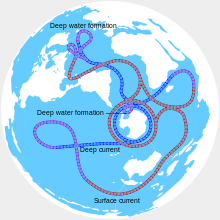
















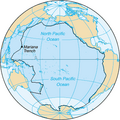


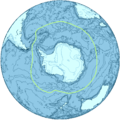




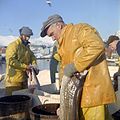





![Image 33An exclusive economic zone (EEZ) map of the Pacific which excludes non-tropical islands.[why?] (from Pacific Ocean)](http://upload.wikimedia.org/wikipedia/commons/thumb/b/bc/Map_of_the_Exclusive_Economic_Zones_of_the_Pacific_Ocean.png/120px-Map_of_the_Exclusive_Economic_Zones_of_the_Pacific_Ocean.png)
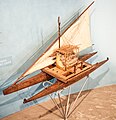










![Image 45"Terres Australes" [sic] label without any charted landmass (from Southern Ocean)](http://upload.wikimedia.org/wikipedia/commons/thumb/8/8e/Geography_world_map.jpeg/120px-Geography_world_map.jpeg)







